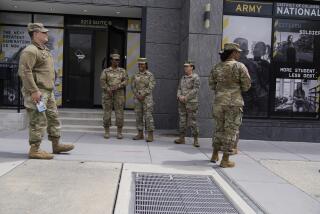2nd tours are ahead for Guard, Reserve
WASHINGTON — Confronted with the increasing demands of the Iraq war, the Pentagon announced plans Thursday to recall Army National Guard units that have already fought in Iraq to serve second tours, reversing a long-standing policy that allowed Guard members to return home for five years before being redeployed.
No new Guard units have been included in the first wave of forces going to Iraq as part of President Bush’s 21,500-troop increase announced Wednesday night, and Defense Secretary Robert M. Gates said the change in policy was made independently of the Iraq buildup.
Other Pentagon officials have acknowledged that additional Guard and Army Reserve units are essential to sustaining Bush’s increase in combat forces in Iraq over the course of the year. The military will probably need to tap previously deployed Guard units this fall to keep 20 combat brigades in Iraq, the level of the buildup.
Army Reserve units also are affected by the policy change.
“The reserve components are going to have to help bear the burden,” said a senior military official, who discussed internal Pentagon decision-making on condition of anonymity. “I would presume by this time next year, we would be calling on our reserve-component brigades to contribute in Iraq.”
Gates also announced he had asked the president to expand the Army and Marine Corps by 92,000 troops, arguing the military’s land forces must be increased to meet ongoing threats beyond the Iraq campaign.
Under the plan, the Army would grow by 65,000, to 547,000 soldiers -- the biggest since the end of the Cold War -- and the Marine Corps by 27,000, to 202,000. Like the new Guard policy, the decision to enlarge ground forces would be a reversal for the Bush administration.
As Defense secretary, Donald H. Rumsfeld, who recently resigned, long objected to expanding the Army and Marines, arguing it would be too costly. The administration’s demurral means the expansion would not help alleviate the strain on the Army and Marines for several years, the time it would take to reach the new limits.
“It will take some time for these new troops to become available for deployment,” Gates said Thursday at a congressional hearing. “But it is important that our men and women in uniform know that additional manpower and resources are on the way.”
The changes in policy came as the Army and Marine Corps formally notified five Army combat brigades that they were being rushed to Baghdad as part of Bush’s plan to increase American forces in Iraq. One of the units, the 2nd Brigade of the 82nd Airborne Division, had been en route to Kuwait as a backup unit and will be redirected to the Iraqi capital.
For each of the next four months, additional Army brigades scheduled to deploy to Iraq this year will head toward Baghdad ahead of schedule.
In February, the 4th Brigade of the 1st Infantry Division will arrive earlier than planned; in March, the 3rd Brigade of the 3rd Infantry Division will be sent; in April, the 4th Brigade of the 2nd Infantry Division; and in May, the 2nd Brigade of the 3rd Infantry Division.
In addition, two Marine battalions in Iraq that had been scheduled to come home next month -- the 3rd Battalion of the 4th Marine Regiment, based in Twentynine Palms, Calif., and the 1st Battalion of the 6th Marine Regiment -- will stay two to three months longer to provide the extra 4,000 troops needed for the western province of Al Anbar.
And a combat brigade from the Minnesota National Guard is being extended by four months to provide extra soldiers for the expanded effort while other units are arriving.
These units will increase U.S. forces in Iraq to about 153,000 by summer. Military planners will have to make another round of decisions starting in July about how to sustain those troop levels. Several Army brigades are scheduled to return home from July through September; officials would have to extend their tours to maintain the 20 brigades Bush has ordered.
More than 200,000 Guard members and reservists from units across the country have served in Iraq or Afghanistan over the last five years, and many who had returned to civilian life could be summoned back into active duty under the policy change. Of 3,018 U.S. military deaths in Iraq, 383 were in the Army National Guard and 214 were Army or Marine reservists, according to iCasualties.org, which tracks military deaths.
Pentagon officials have said that the next round of deployments are most likely to involve the first regiments sent to Iraq in 2003 and early 2004. Among those early units was the California National Guard’s 1st Battalion, 185th Armored Regiment, from San Bernardino, now an infantry unit, which served in Iraq from early 2004 until 2005.
In an attempt to head off opposition to remobilizing Guard brigades, the Pentagon said it would reduce the length of time Guard units must serve if they are called up again. In previous deployments to Iraq, Guard members frequently were activated for as long as 18 months -- several months to organize and train, and at least a year in the war zone.
Under the new policy, Guard units would be mobilized for only a year, meaning they would probably spend nine or 10 months in Iraq. In addition, Pentagon officials said, Guard members would be paid extra if forced to deploy a second time before spending five years at home.
Meanwhile, the Pentagon is reviewing its “hardship waiver program,” in which members of the Guard and active-duty Army can avoid deployment if a repeat Iraq tour would cause their families exceptional difficulties. The review could lead to more such waivers.
Times staff writer Julian E. Barnes contributed to this report.
*
(BEGIN TEXT OF INFOBOX)
Deployment plan
The following military units were tapped to go to Iraq or had their terms extended:
New unit
2nd Brigade, 82nd Airborne,
Ft. Bragg, N.C. (already en route to Kuwait, moving into Iraq
this month)
Units extended
Minnesota National Guard brigade (was to come home in March, now coming home in August)
3rd Battalion, 4th Marine Regiment, Twentynine Palms (was to come home in February, extended 60 to 90 days)
1st Battalion, 6th Marine Regiment, Camp Lejeune, N.C.
(was to come home in February, extended 60 to 90 days)
15th Marine Expeditionary Unit, Camp Pendleton (remaining
in Iraq 45 days longer)
Units leaving for Iraq two to three months early
4th Brigade, 1st Infantry Division, Ft. Riley, Kan. (leaving for Iraq in early February)
3rd Brigade, 3rd Infantry Division, Ft. Benning, Ga. (leaving in March)
4th Brigade, 2nd Infantry Division, Ft. Lewis, Wash. (leaving in April)
2nd Brigade, 3rd Infantry Division, Ft. Stewart, Ga. (leaving in May)
Sources: Department of Defense,
Times research
More to Read
Sign up for Essential California
The most important California stories and recommendations in your inbox every morning.
You may occasionally receive promotional content from the Los Angeles Times.










